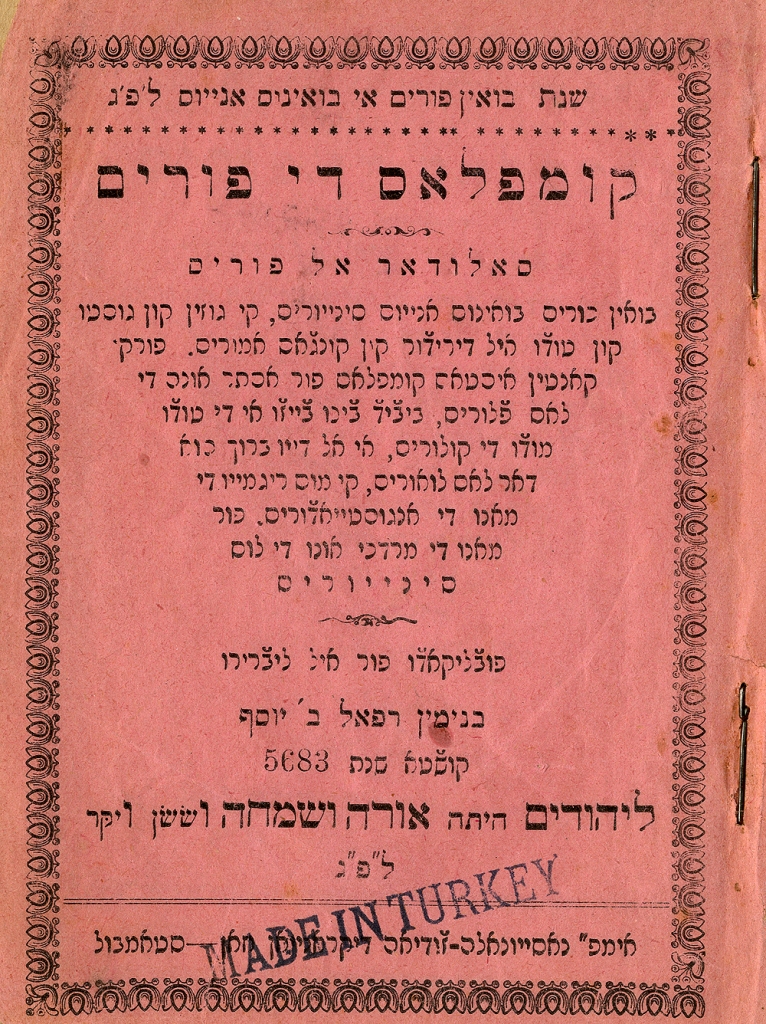
Front cover of Komplas de Purim Saludar el Purim. Printed in Istanbul, 1922 or 1923. Courtesy of Hazzan Isaac Azose
Did you know that if you are in Istanbul during Purim you should dance and jump when celebrating, but if you happen to be in Italy, you ought to laugh and sing?
These are but two variations among the many Purim customs of Sephardic Jews. As is well known, Jews around the world—Sepharadim, Ashkenazim and many others—traditionally celebrate the holiday by reading the Book of Esther, providing charity to those in need, and giving gifts of food and drinks to friends and family. The afternoon meal, know as se’udat Purim, traditionally consists of delicious meats and copious amounts of wine. (See “Sephardic Purim Customs from the Old World to the Pacific Northwest”). Sephardic Jews developed an additional tradition connected to the holiday: singing songs in Judeo-Spanish, known as komplas (or koplas) de Purim that relate the events and personalities of the Book of Esther
Although it is rare today to find someone who knows how to sing the Judeo-Spanish songs, through the Sephardic Studies Library we have been able to preserve numerous songbooks containing Koplas de Purim. That’s how we know the differences in customs between Sephardic Jews in Istanbul and those in Italy.
Here is one you might enjoy singing this year.
Empesar kero kontar
First stanza:
Empesar kero kontar echas del Dio Alto,
De lo ke kero enmentar nada yo no falto,
Kon bayles i saltos i kon gran plazer,
Porke Aman el mamzer,
Mos kijo matarmos
tambien atemarmos.
To start I wish to recount deeds of the Almighty G-d,
From what I wish to describe, nothing will be left out,
With dancing and jumping and with great pleasure,
Because Aman the bastard
He wanted to kill us
And also to terrify us.
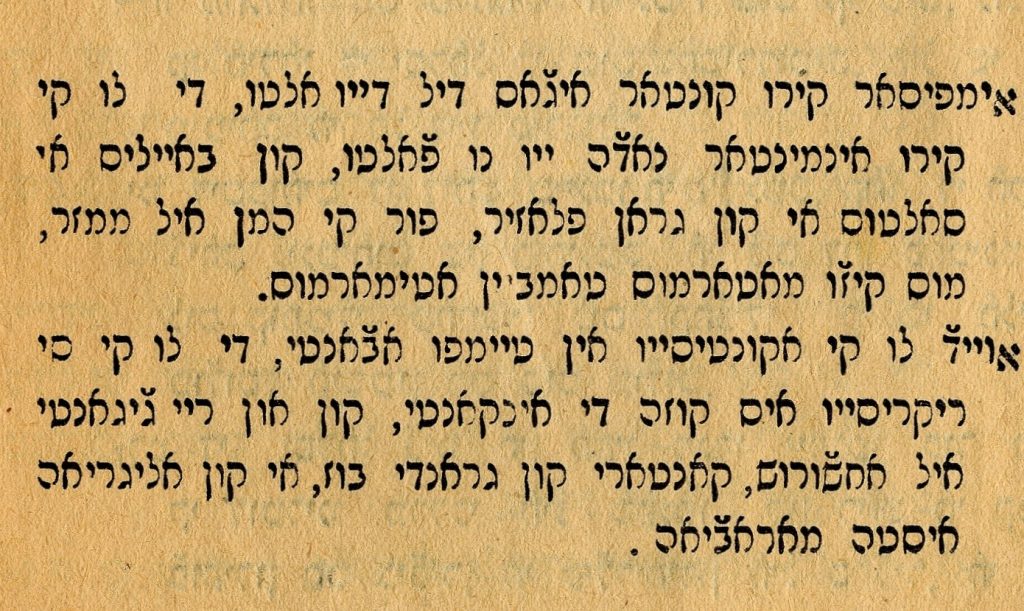
“Empesar Kero Kontar,” the first song in Benjamin Yosef’s Komplas de Purim: Saludar el Purim, 1922.
Second stanza:
Oyed lo ke akontesyo en tiempo avante,
De lo ke se rekresio es koza de enkante,
Kon un rey djigante el Ahashverosh,
Kantare kon grande boz,
I kon alegria esta maravia.
Listen to what occurred in the times of old
And what transpired was something amazing.
It deals with a great king Ahashverosh
I will sing loudly
About this miracle.
This song is found in at least two books in the Sephardic Studies Collection at the University of Washington.
The above text is transliterated and translated from Komplas de Purim: Saludar el Purim, printed in Istanbul in the Hebrew year 5683 (1922 or 1923). This edition was published by Benjamin Raphael ben Yosef, one the most prolific printers of religious and secular books in Ladino and Hebrew in the Ottoman Empire during the early twentieth century. A similar text is found in an earlier work Sefer Alegria de Purim, published in Livorno, Italy, in 1902 by the well-known printing house established in the nineteenth century by Solomon Belforte.
One noticeable difference between the edition printed in Istanbul is found in the third line of this song, which states that the holiday should be celebrated with dancing and jumping (bayles i salto), whereas in the Livorno edition it is celebrated with laughing and singing (riza i kanto). All editions agree that is should be celebrated with gran plazer (great pleasure).

“Empesar kero kontar” from Sefer Alegria de Purim, published in Livorno, 1902
Kon bayles i saltos i kon gran plazer.
With dancing and jumping and with great pleasure.
(Komplas de Purim, published in Istanbul, 1922 )
Kon riza i kanto i kon gran plazer,
With laughing and singing and with great pleasure.
(Sefer Alegria de Purim, published in Livorno, 1902)
The first Sephardic rabbi ordained in the United States, Rabbi Solomon Maimon, may he live to 120, donated this copy of Sefer Alegria de Purim, now available for viewing in the Sephardic Studies Collection. Another comes from the collection of his late brother, Sam Bension Maimon, author of “The Beauty of Sephardic Life.” In 1990, the Maimon brothers joined Leo Azose of Marmara, and the esteemed Reverend Samuel Benaroya of Edirne, to record a version of “Empesar kero kontar” on their album “The Sephardic Ladino Tradition : Judeo-Spanish religious songs and liturgical chants : according to the Turkish Balkan tradition.”
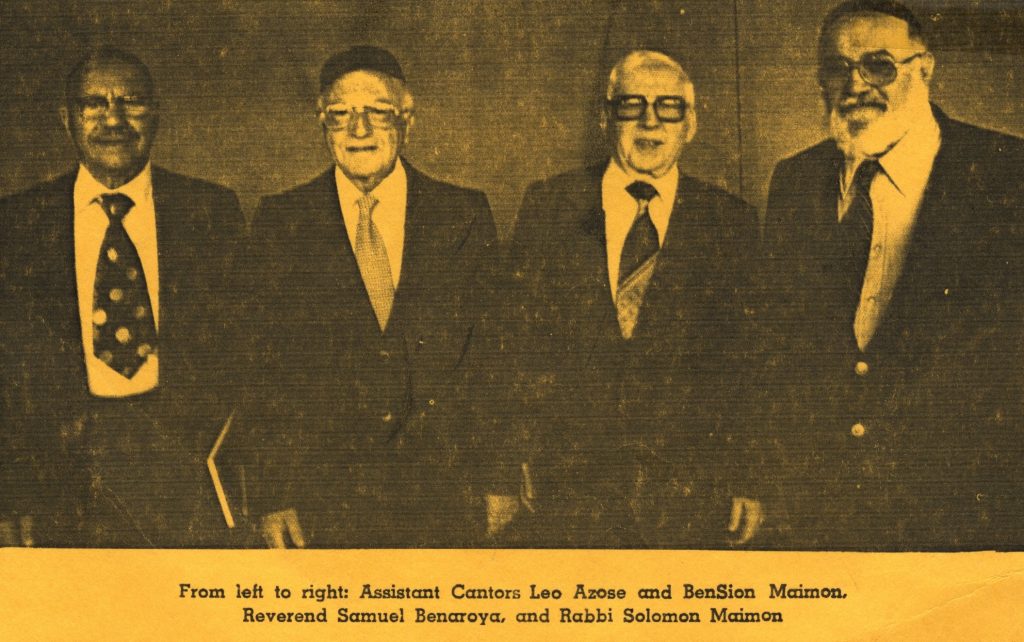
The back cover of “The Sephardic Ladino Tradition : Judeo-Spanish religious songs and liturgical chants : according to the Turkish Balkan tradition.” (Carmi House, North Hollywood, Calif.)
Curiously, the traditional refrain of this song is not found in either the Istanbul nor the Livorno editions.
En Shabbat, le enforkaron,
Alhad le enteraron, Hey!
On Shabbat they hanged him
On Sunday they buried him. Hey!
However, this refrain is found in Sam “Bension” Maimon’s “Beauty of Sephardic Life” and in a recording with the author and other members of the Seattle Sephardic community in “The Sephardic Ladino Tradition.”
Even more interesting is the introduction of the idea that Aman was executed on Shabbat and buried on Sunday, which does not appear to have its source in the most well know rabbinical commentaries on the book of Esther.
Keridos meldadores, dear readers: Please let us know if you are able to find a source for this mysterious tradition!
We hope to share with you the rendition of “Empesar kero kontar” performed by some of the greatest leaders and singers from Seattle’s Sephardic Bikkur Holim Congregation, which is currently being digitized, next Purim.
In the mean time, enjoy this rendition of “Empesar kero kontar” performed by Shmuel Altalef of Izmir, Turkey, from the Collection of Susana Weich-Shahak at the National Library of Israel.
Buen Purim, buen anyos
Buen ke tengamos
Todos los anyos
Happy Purim, good years,
May we have joy
Every year!



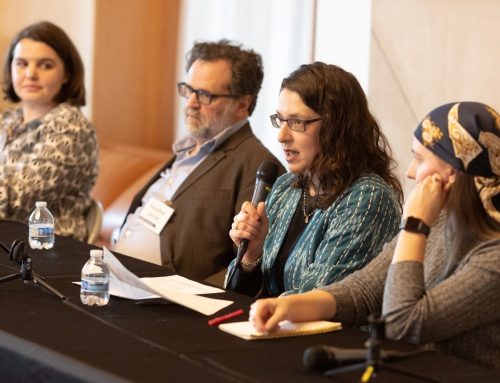
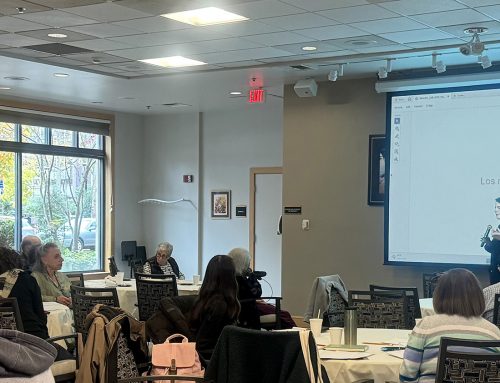


I know this words + music
From my Nona.